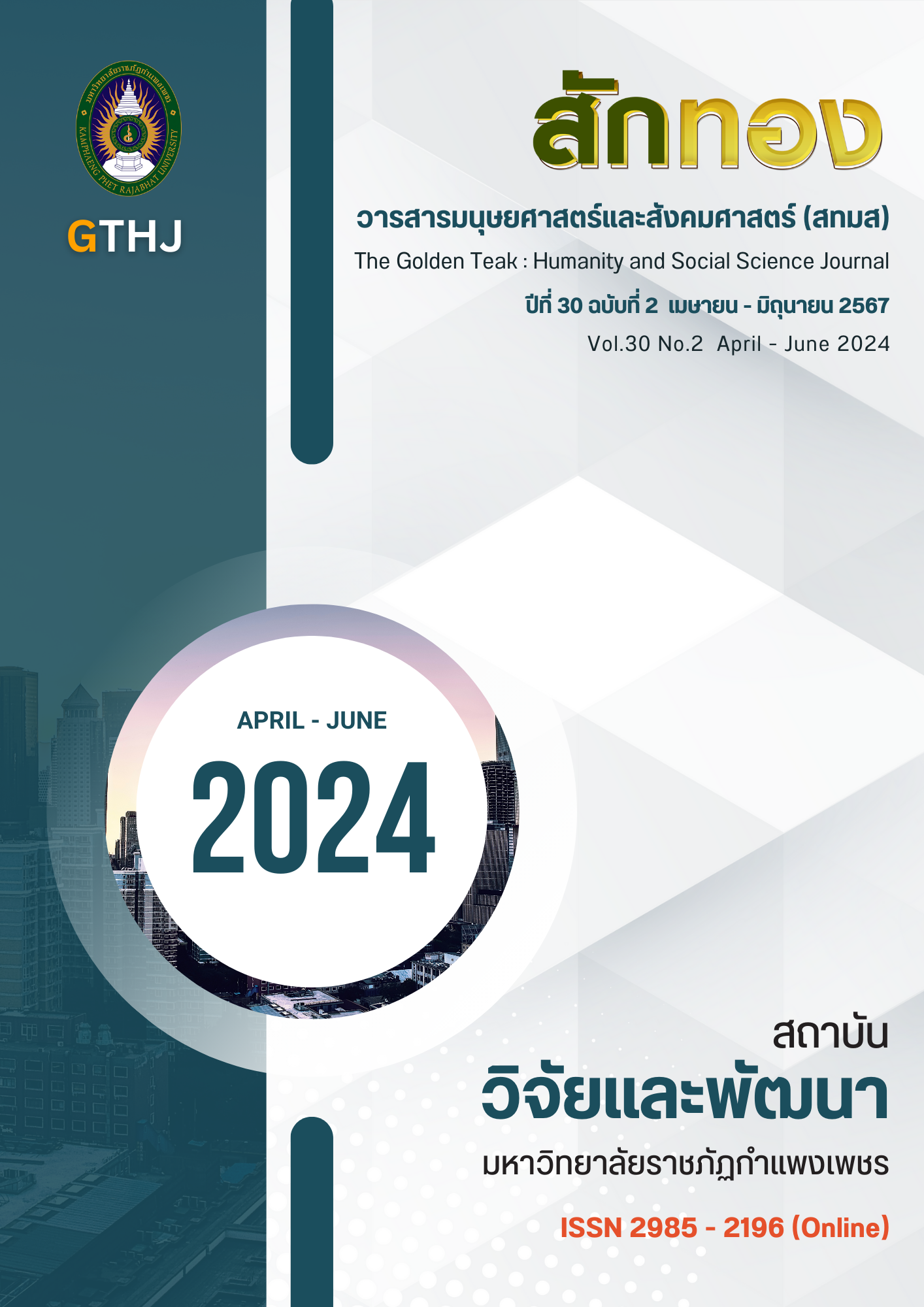Promoting Digital Citizenship for Youth at Risk of Committing an Offense the Computer-Related Crime Act in Chiang Rai Province
Main Article Content
Abstract
This study aimed to 1) develop an activity model to enhance digital citizen characteristics among youth in Chiang Rai province and to 2) enhance digital citizenship for at-risk youth breaking the Computer-related Crime Act. The sample group was 29 students enrolled in vocational education courses, divided by purposive sampling into 2 groups, namely the experimental group of 16 students and the control group of 13 students. The research instruments were the Risk Assessment Form for Computer-related Crime Act (No. 2) B.E. 2560, the digital citizenship questionnaire and the activities for enhancing digital citizenship. The results of the study found that: 1) the digital citizen scores of the experiment group in all three periods; the pre-participation, the post-participation and follow-up period with statistical significant at 0.05 level; the follow-up period (M = 4.431, S.D.= 0.379), the post-activity period (M = 4.326, S.D.= 0.490) and the pre-activity period (M = 4.121, S.D. = 0.541) respectively; 2) a covariance analysis of the digital citizenship scores of the post-participation sample with pre-participation scores as a control variable found that the experimental and control groups had no statistically significant difference.
Article Details

This work is licensed under a Creative Commons Attribution-NonCommercial-NoDerivatives 4.0 International License.
บทความที่ได้รับการตีพิมพ์เป็นลิขสิทธิ์ของวารสาร สักทอง : วารสารมนุษยศาสตร์และสังคมศาสตร์ สถาบันวิจัยและพัฒนา มหาวิทยาลับราชภัฏกำแพงเพชร
ข้อคิดเห็นใดๆ ที่ปรากฎในวารสารเป็นวรรณกรรมของผู้เขียนโดยเฉพาะ ซึ่งมหาวิทยาลัยราชภัฏกำแพงเพชรและบรรณาธิการไม่จำเป็นต้องเห็นด้วย
References
Amnuaiphanwilai, A., Yuangsoi, P., Keawurai, R. & Phumpuang, K. (2022). The development model of cloud based learning by using collaborative learning and critical thinking to enhance digital media literacy for secondary. The Golden Teak : Humanity and Social Science Journal (GTHJ.), 28(3), 81-94. [In Thai]
Chaowakeeratiphong, T. & Wongnaya, S. (2020). Guidelines to develop digital citizenship of students at the faculty of education, Kamphaeng Phet Rajabhat University. The Golden Teak : Humanity and Social Science Journal (GTHJ.),
(4), 72-85. [In Thai]
Ekakul, T. (2009). Research methodology in behavioral sciences and social sciences. (6 th ed). Ubon Ratchathani : Witthaya Offset Printing. [In Thai]
National Statistical Office. (2021). The 2021 Household Survey on the Use of Information and Communication Technology (Quarter 2). Bangkok : National Statistical Office. [In Thai]
Netwong, T. (2013). The Using of e-Learning to Develop Digital Citizenship and Learning Achievement in Information Technology. International Journal of e-Education, e-Business, e-Management and e-Learning, 3(2), 135-137. [In Thai]
Permpoonwiwat, S., Mansap, S. & Kaewmano, J. (2021). Citizenship and Digital Literacy Survey. Research report, King Prajadhipok’s Institute. [In Thai]
Rodsaen, A. (2014). The Development of Collaborative Learning Model to Enhance Citizenship Instructional Competences for Basic Educational Teacher. Doctor of Education’s thesis, Naresuan University. [In Thai]
Sarika, V., Mangkhang, C. & Dibyamandala, J. (2021). Social studies learning package development in economics integrating with historical process to enhance digital citizenship foe secondary student. Journal of MCU Nakhondhat, 8(5), 73-86. [In Thai]
Tapingkae, P., Panjaburee, P., Hwang, G. & Srisawasdi, N. (2020). Effects of a formative assessment-based contextual gaming approach on students’ digital citizenship behaviors, learning motivations, and perceptions. ScienceDirect, 159, 1-16. [In Thai]
Thailand Computer Emergency Response Team (ThaiCERT). (2020). Incident Report Statistics. [Online]. Available : https://www.thaicert.or.th/statistics/statistics.html [2020, August 6]. [In Thai]
Wongkitrungruang, W. (2019). Digital Citizenship. Bangkok : Di Wan O One percent. [In Thai]


